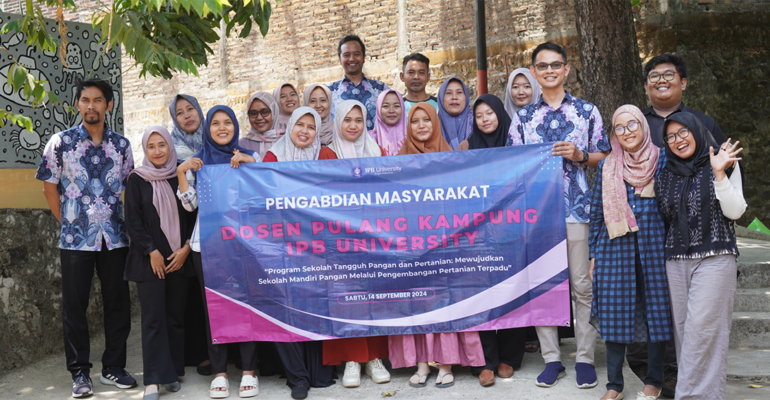IPB University Lecturers Introduce Integrated Agricultural Management and Food Safety through Dospulkam Program

IPB University lecturers through the Dosen Pulang Kampung (Dospulkam) program held an activity themed Food and Agriculture Resilient School at Semai School, Jepara Regency, Central Java. This activity aims to strengthen school food self-sufficiency in facing multi-sectoral challenges, such as nutrition, health, education, and food security.
The Dospulkam activity was lead by Rici Tri Harpin Pranata, MSi from the Digital Communication and Media Study Program, IPB University Vocational School. “Sekolah Tangguh Pangan dan Pertanian encourages food independence at the school level to improve the quality of children’s nutrition and health, agricultural education facilities, and improve the local food system,” said Rici.
Furthermore, he explained that the Food and Agriculture Resilient School innovation further strengthens agricultural and environmental education to support the regeneration of agricultural human resources (HR), because children have been introduced early to agriculture.
“In addition, this program encourages schools to be able to meet the needs of quality food by integrating school gardens or limited land with school canteen management, as well as assistance in managing healthy canteens in providing quality food,” said Rici.
The event, which took place in the Semai School classroom, involved dozens of participants from teachers, school canteen managers and school garden managers. The Principal of Semai School, Tri, appreciated the Dospulkam program that has shared knowledge and experience and is willing to assist Semai School. He hopes this program can be continued.
“Hopefully this will be the first step to realize Semai’s goal of becoming a food-empowered school. Hopefully this collaboration will continue in relation to healthy and quality food in schools,” he said.
Tri Budiarto, a lecturer at IPB University Vocational School from the Production Technology and Development of Agricultural Communities Study Program, delivered the material ‘Integrated Agriculture in the School Environment’. He explained the importance of integrated farming for students and the role of teachers in its implementation.
“Integrated farming is very good for students’ holistic knowledge in understanding agriculture, practical skills such as planting, caring, and harvesting, as well as environmental awareness,” Tri said.
Another speaker, Firman Muhammad Basar, a lecturer in the Food Service and Nutrition Industry Management Study Program, delivered the material ‘Nutritional Adequacy and Food Safety through the Implementation of Good Manufacturing Practices (GMP), Standard Sanitation Operational Procedure (SSOP), and Hazard Analysis Critical Control Point (HACCP)’. He explained that there are standards that need to be met in food production, processing, and distribution both at the industrial level and at the school canteen level in order to produce quality products.
“It is very important to apply GMP, SSOP, and HACCP in the process from the beginning to the end of food processing. How are production standards, good sanitation, and food safety guarantees to avoid hazards that could arise,” concluded Firman.
In addition, on this occasion, IPB University lecturers provided superior seeds of vegetable and fruit plants to be sown on limited school land by garden managers, teachers, and students whose results could later be utilized for healthy school canteens. (RTP/Lp) (IAAS/Hap)



